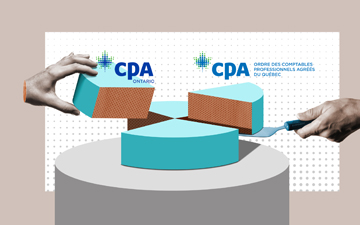Ontario, Quebec accounting bodies announce planned split from CPA Canada

Why the Collaboration Accord, which outlines the roles and finances of the governing bodies, defines the challenges facing the accounting profession
TORONTO, June 21, 2023 – The provincial accounting bodies regulating chartered professional accountants in Ontario and Quebec have split with CPA Canada over the future governance of the Canadian accounting profession.
Both organizations, CPA Ontario and CPA Quebec, say their provincial economies are “unique” and their decision to sever ties with Chartered Professional Accountants of Canada is in the public interest. The change will take effect in 18 months when the current collaborative agreement ends between the provincial and national bodies.
The announcements have exposed a rift between the governing bodies of chartered professional accountants. Governance of the profession is circumscribed in the Collaboration Accord, which outlines the roles, standards and cost-sharing structures. It was created during unification of the profession in 2013 and includes a five-year review built into its terms.
The agreement has been under review by a task force for several years and negotiations were ongoing. In a press release, CPA Canada said it was “disappointed and surprised” by the announcement, and urged Ontario and Quebec to “re-engage” and work together with a “world-class conciliator.” CPA Canada chief executive office Pamela Steer told the Globe and Mail that the “dispute was around ‘a few key issues’ where the two provinces are seeking to have more control over the profession.”
Ontario, Quebec represent significant opposition to CPA Canada
The move comes exactly 10 years after the former Institute of Chartered Accountants of Ontario announced the creation of Chartered Professional Accountants of Ontario. Not only is CPA Ontario the largest provincial accounting body, its membership comprises the powerful partners of the Big Four accounting firms and the business interests of Bay Street.
Similarly, as the francophone voice of Canadian accounting, CPA Quebec Ordre des CPA du Québec) has political clout, as seen recently in its opposition to the transparency reforms of the Canadian Public Accountability Board. The two organizations together represent significant opposition to CPA Canada.
The profession has also undergone significant challenges in recent years. Members complain that their annual fees to provincial and federal bodies are too high. (CPA Ontario members pay about $1,200 per year, which is less than doctors, lawyers and dentists in the province.) CPA Ontario addressed this issue in an email to members, stating: “When the transition is complete, you will notice a significant cost reduction reflected in your annual membership dues, which currently includes both CPA Ontario and CPA Canada’s fees.”
The high-profile breakdown of the national online accounting exam in 2019 embarrassed the profession and symbolized a technology deficit in delivery and training. And the brief tenure of former CPA Canada head Charles-Antoine St-Jean surprised the profession.
As reported by Canadian Accountant, the new Canadian Sustainability Standards Board is expected to cost about $10 million, in addition to the costs of the legacy standard-setting bodies, which in the past was paid for through membership fees. Sustainability standards have been largely driven by CPA Canada, whose national initiatives have overshadowed the provincial bodies, including CPA Ontario, which had a legacy history of substantial influence.
Similarly, anticipated changes to the CPA program — the education program for future accountants — has concerned members. According to CPA program coach Gevorg Grigoryan, the new Competency Map 2.0 may “gut” the program of electives and the national accounting exam. Legacy chartered accountants still resentful of unification see the future direction of the program as a further watering down of standards and their reputations.
As professional regulators, the provincial accounting bodies are unusual in terms of governance, as they combine regulatory powers with advocacy initiatives. Professional bodies have largely moved away from this model of self-regulation. The Government of Ontario in particular has emphasized governance modernization in health-care regulation. Both CPA Ontario and CPA Quebec, however, emphasized the public interest in their press releases, and pledged to cooperate with other provincial and territorial bodies, as well as with CPA Canada, in the interim.
By Canadian Accountant staff.









(0) Comments